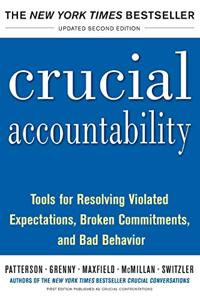
Want to learn the ideas in Crucial Confrontations better than ever? Read the world’s #1 book summary of Crucial Confrontations by Kerry Patterson, Joseph Grenny, Ron McMillan, Al Switzler here.
Read a brief 1-Page Summary or watch video summaries curated by our expert team. Note: this book guide is not affiliated with or endorsed by the publisher or author, and we always encourage you to purchase and read the full book.
Video Summaries of Crucial Confrontations
We’ve scoured the Internet for the very best videos on Crucial Confrontations, from high-quality videos summaries to interviews or commentary by Kerry Patterson, Joseph Grenny, Ron McMillan, Al Switzler.
1-Page Summary of Crucial Confrontations
Speak Up
A Crucial Confrontation
- Crucial means that the stakes are high. For example, in 1982 a plane crashed and 74 people died because of their lack of communication about ice buildup on the wings. Confrontations are about accountability. To confront means to demand accountability. Confrontation seems to suggest conflict but it can be used for resolving problems and improving relationships when done well. People often don’t question those who have higher status or authority, which has led to disasters large and small (such as a man having surgery on his ear when he was supposed to get an earache treatment).
People tend to handle confrontations in two ways: either through timidity or rage. Some people avoid the problem altogether, while others get angry and lash out violently.
A crucial confrontation is a direct and open discussion of a problem. It’s important to be able to deal with confrontations in order to solve problems. Mastering crucial confrontations can have lasting, positive impact on your ability to solve problems.
How to Decide What Confrontations to Have
When a problem occurs, discuss what went wrong. If the problem continues or happens repeatedly, talk about the pattern. If it’s a personal issue, discuss the relationship between you and that person. Finally, discuss consequences and intentions. But first know when to confront someone; don’t confront them if they did not do anything on purpose (and there is no harm done).
When you’re dealing with a crucial confrontation, make sure that you understand what’s happening. Don’t jump to conclusions about the other person’s motives; instead, think about whether there might be a reasonable explanation for their actions. Think about what could motivate them and how they might be able to accomplish something if it were possible.
The Crucial Confrontation in Action
There are several characteristics that make people good at confrontation:
- People who want to improve their relationships with others should start by identifying the problem and framing it in a way that’s not hostile. It also helps if they can establish priorities for solving the issue or problems at hand. They should know how to discipline people, remove disincentives or barriers that make compliance difficult, cope with unexpected situations, and avoid using tricks like sandwiching (that is, inserting a line of criticism between two lines of praise). It would also be helpful if you don’t ambush people by starting off talking about other things before suddenly bringing up what’s bothering you. You shouldn’t use entrapment either—you shouldn’t expect people to understand what you mean without explanation. Don’t blame others for your need to confront them; instead take responsibility for your actions and don’t play good cop/bad cop games.”
Instead of avoiding confrontation, approach it honestly and straightforwardly. Explain to the other person what you saw and why you think that they’re wrong. Try to find a way to make sure that both parties understand each other’s point of view, as well as their own shortcomings. State your case in a calm manner, without anger or malice. If necessary, admit when you were wrong about something so that the other party feels comfortable telling you when they are also wrong about things.
If you’re addressing a difficult topic, ask for the other person’s permission to talk about it. You’ll show respect and build an impression of mutuality by doing so. If your conversation is private, don’t discuss sensitive topics in public.
When you’re confronting someone, start by talking about the facts. Don’t talk about their motives or what other people have said.





